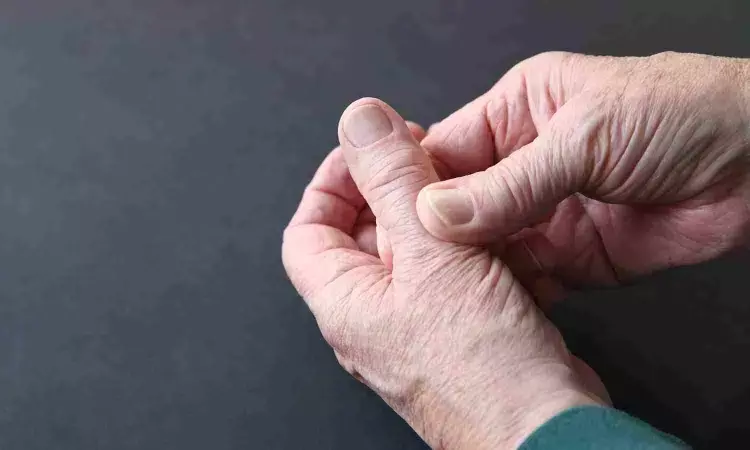- Home
- Medical news & Guidelines
- Anesthesiology
- Cardiology and CTVS
- Critical Care
- Dentistry
- Dermatology
- Diabetes and Endocrinology
- ENT
- Gastroenterology
- Medicine
- Nephrology
- Neurology
- Obstretics-Gynaecology
- Oncology
- Ophthalmology
- Orthopaedics
- Pediatrics-Neonatology
- Psychiatry
- Pulmonology
- Radiology
- Surgery
- Urology
- Laboratory Medicine
- Diet
- Nursing
- Paramedical
- Physiotherapy
- Health news
- Fact Check
- Bone Health Fact Check
- Brain Health Fact Check
- Cancer Related Fact Check
- Child Care Fact Check
- Dental and oral health fact check
- Diabetes and metabolic health fact check
- Diet and Nutrition Fact Check
- Eye and ENT Care Fact Check
- Fitness fact check
- Gut health fact check
- Heart health fact check
- Kidney health fact check
- Medical education fact check
- Men's health fact check
- Respiratory fact check
- Skin and hair care fact check
- Vaccine and Immunization fact check
- Women's health fact check
- AYUSH
- State News
- Andaman and Nicobar Islands
- Andhra Pradesh
- Arunachal Pradesh
- Assam
- Bihar
- Chandigarh
- Chattisgarh
- Dadra and Nagar Haveli
- Daman and Diu
- Delhi
- Goa
- Gujarat
- Haryana
- Himachal Pradesh
- Jammu & Kashmir
- Jharkhand
- Karnataka
- Kerala
- Ladakh
- Lakshadweep
- Madhya Pradesh
- Maharashtra
- Manipur
- Meghalaya
- Mizoram
- Nagaland
- Odisha
- Puducherry
- Punjab
- Rajasthan
- Sikkim
- Tamil Nadu
- Telangana
- Tripura
- Uttar Pradesh
- Uttrakhand
- West Bengal
- Medical Education
- Industry
Can genetics impact need for surgery in patients with thumb osteoarthritis?

Rhizarthrosis, also known as trapeziometacarpal osteoarthritis, is a type of osteoarthritis that affects the thumb, and treatments range from splints to surgery. Investigators have uncovered various genetic differences between individuals with rhizarthrosis who undergo surgery for their condition versus those who opt for nonsurgical treatments.
The study, which is published in the Journal of Orthopaedic Research, included 1,083 surgical patients and 1,888 nonsurgical patients with rhizarthrosis, as well as 205,371 controls without osteoarthritis.
Researchers identified 7 genetic variants that may be associated with surgical rhizarthrosis and 3 variants suggestively associated with nonsurgical rhizarthrosis. They noted that uncovering genetic differences between these patient groups may reveal biological mechanisms that affect various aspects of rhizarthrosis.
“Our findings delve into the genetic architecture of osteoarthritis in the thumb base, hinting at a potential genetic influence on the need for surgery,” said corresponding author Cecilie Henkel, MD, PhD, of Copenhagen University Hospital Hvidovre, in Denmark. “While no solid conclusions about the effect of specific genetic variants on the need for surgical treatment should be made at this stage, our study marks a stride towards integrating genetic insights into the clinical management of osteoarthritis, with the long-term aim of refining diagnosis, treatment, and preventative strategies for this common and debilitating disease.”
Reference:
Cecilie Henkel, DBDS Genomic Consortium, Christian Erikstrup, Sisse R. Ostrowski, Ole B. Pedersen, Anders Troelsen, Genetics may affect the risk of undergoing surgery for rhizarthrosis, Journal of Orthopaedic Research, https://doi.org/10.1002/jor.25753.
Dr Kamal Kant Kohli-MBBS, DTCD- a chest specialist with more than 30 years of practice and a flair for writing clinical articles, Dr Kamal Kant Kohli joined Medical Dialogues as a Chief Editor of Medical News. Besides writing articles, as an editor, he proofreads and verifies all the medical content published on Medical Dialogues including those coming from journals, studies,medical conferences,guidelines etc. Email: drkohli@medicaldialogues.in. Contact no. 011-43720751


